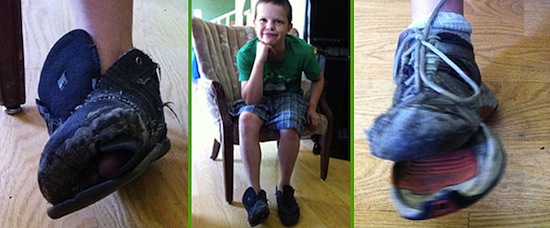The Children’s Defense Fund has launched a new series of stories on our web site featuring children and their parents who have fallen on very hard times. They are the real faces and fears behind our disgraceful national child poverty statistics -- 16.4 million poor children living in the richest nation on earth. In 2010, over a million more children fell into poverty, over half a million more into extreme poverty. Forty-three states saw increases in poverty for children under six, the most critical years for brain development. Extreme poverty, defined as an annual income of less than half the poverty level, means less than $30 a day for a family of four. Forty-one states saw an increase in extreme child poverty in 2010.
Pulitzer Prize-winning reporter Julia Cass traveled to Michigan for the Children’s Defense Fund to meet families with children our national and safety nets had failed to catch. One of the families she met was the McKees -- and as she noted, “Shoes tell the story of the McKee family’s descent into poverty.

The shoes belonging to Skyler, 10, and Zachery, 12, are falling apart. Their sister, Jordan, 14, wears the varsity coach’s shoes when she plays on her school’s volleyball team. Less visible is hunger. The children and their parents, Tonya and Ed McKee, of Dowagiac, Michigan, sometimes went without food this summer when Ed’s unemployment insurance ran out and the family was not yet receiving food stamps. Skyler told Cass he gave the birthday money he got at church to his mom for groceries, “and I told her she didn’t have to pay me back.” Skyler confided that sometimes his stomach has growled. “It’s hard, not easy like it was before where we had money and could do stuff. Now we don’t go anywhere… Sometimes we don’t have food and we just don’t eat.”
Cass reported, “Cass County in southwestern Michigan, where Dowagiac is located, is a pretty area of lakes and farmland. Ed McKee comes from a farming family, and was working as a breeding manager at a large hog farm when he was laid off in July 2009. Ed said ‘to save money,’ the company replaced him and several other employees with new workers earning a lower wage. ‘There are other farms around here but they just aren’t hiring,’ he said. ‘If they are, you better be the first to know. There’s a lot of people waiting in line to get that job.’ Factory work? ‘They closed most of them around here. There’s a tool and dye plant that makes parts for Ford and Chevy that closed and just opened back up, but you have to be on their call list to get hired. It’s frustrating to walk into a place and they say they’re not hiring or they say they are hiring and you put in an application and never hear from them.’”
Meanwhile, Tonya baked cakes in their home to supplement their income; their son Zachery is a special needs child who didn’t speak until a few years ago, and Tonya hadn’t worked at a job since he was born. This summer, Cass notes, everything got even worse: “Ed’s unemployment insurance ended in May, and there was a month and a half gap before the McKees began receiving food stamps. Their only income was the monthly Social Security disability check for Zachery. ‘Ed and I went hungry some nights so we could feed the kids,’ Tonya said. ‘A lady here in town has brought us food several times and went shopping for us several times. And our parents helped when they could. Otherwise, we didn’t know where the next meal would come from. One of my friends brought over some cereal and milk one day and the boys said, “Wow! We get cereal!”’
The McKee children are three of the new faces of child poverty in America. But as families like the McKees know, poverty hits children of all colors, all ages, and in all states. Children of color are disproportionately poor. Over one in four Black children were poor in 41 states and the nation’s capital, and over one in four Hispanic children were poor in 43 states. In many states, the news was even worse for the youngest children: 40 percent or more of Black newborns to kindergartners were poor in 30 states and the nation’s capital, including 15 states where half were poor, and 40 percent or more of Hispanic newborns to kindergartners were poor in 14 states.
Is this the best America can do? Is this the reflection of our values as a nation? These child poverty statistics are morally and economically indefensible. The toxic cocktail of poverty, family joblessness and stress, food insecurity, lost homes, and growing hopelessness are a national human disaster requiring the most urgent response from our political and business leaders in every party and place. Children deserve more than intransigent political grandstanding. They need shoes to protect exposed toes from the cold and food to soothe their growling stomachs. Shame on those who seek to rip out more threads from our rich nation’s tattered safety net while protecting tax cuts for millionaires. Skyler, Zachery, and Jordan McKee and the millions of children like them deserve more from our country.
